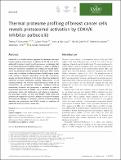| dc.contributor.author | Miettinen, Teemu P. | |
| dc.contributor.author | Peltier, Julien | |
| dc.contributor.author | Härtlova, Anetta | |
| dc.contributor.author | Gierliński, Marek | |
| dc.contributor.author | Jansen, Valerie M. | |
| dc.contributor.author | Trost, Matthias | |
| dc.contributor.author | Björklund, Mikael | |
| dc.date.accessioned | 2024-11-05T19:14:00Z | |
| dc.date.available | 2024-11-05T19:14:00Z | |
| dc.date.issued | 2018-04-18 | |
| dc.identifier.uri | https://hdl.handle.net/1721.1/157493 | |
| dc.description.abstract | Palbociclib is a CDK4/6 inhibitor approved for metastatic estrogen receptor‐positive breast cancer. In addition to G1 cell cycle arrest, palbociclib treatment results in cell senescence, a phenotype that is not readily explained by CDK4/6 inhibition. In order to identify a molecular mechanism responsible for palbociclib‐induced senescence, we performed thermal proteome profiling of MCF7 breast cancer cells. In addition to affecting known CDK4/6 targets, palbociclib induces a thermal stabilization of the 20S proteasome, despite not directly binding to it. We further show that palbociclib treatment increases proteasome activity independently of the ubiquitin pathway. This leads to cellular senescence, which can be counteracted by proteasome inhibitors. Palbociclib‐induced proteasome activation and senescence is mediated by reduced proteasomal association of ECM29. Loss of ECM29 activates the proteasome, blocks cell proliferation, and induces a senescence‐like phenotype. Finally, we find that ECM29 mRNA levels are predictive of relapse‐free survival in breast cancer patients treated with endocrine therapy. In conclusion, thermal proteome profiling identifies the proteasome and ECM29 protein as mediators of palbociclib activity in breast cancer cells. | en_US |
| dc.publisher | Nature Publishing Group UK | en_US |
| dc.relation.isversionof | https://doi.org/10.15252/embj.201798359 | en_US |
| dc.rights | Creative Commons Attribution | en_US |
| dc.rights.uri | https://creativecommons.org/licenses/by/4.0/ | en_US |
| dc.source | Nature Publishing Group UK | en_US |
| dc.title | Thermal proteome profiling of breast cancer cells reveals proteasomal activation by CDK4/6 inhibitor palbociclib | en_US |
| dc.type | Article | en_US |
| dc.identifier.citation | The EMBO Journal. 2018 Apr 18;37(10):EMBJ201798359 | en_US |
| dc.contributor.department | Koch Institute for Integrative Cancer Research at MIT | en_US |
| dc.relation.journal | The EMBO Journal | en_US |
| dc.eprint.version | Final published version | en_US |
| dc.type.uri | http://purl.org/eprint/type/JournalArticle | en_US |
| eprint.status | http://purl.org/eprint/status/PeerReviewed | en_US |
| dc.date.updated | 2024-10-27T17:14:48Z | |
| dc.language.rfc3066 | en | |
| dc.rights.holder | The Author(s) | |
| dspace.date.submission | 2024-10-27T17:14:48Z | |
| mit.journal.volume | 37 | en_US |
| mit.journal.issue | 10 | en_US |
| mit.license | PUBLISHER_CC | |
| mit.metadata.status | Authority Work and Publication Information Needed | en_US |
